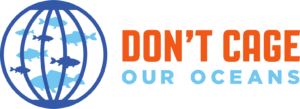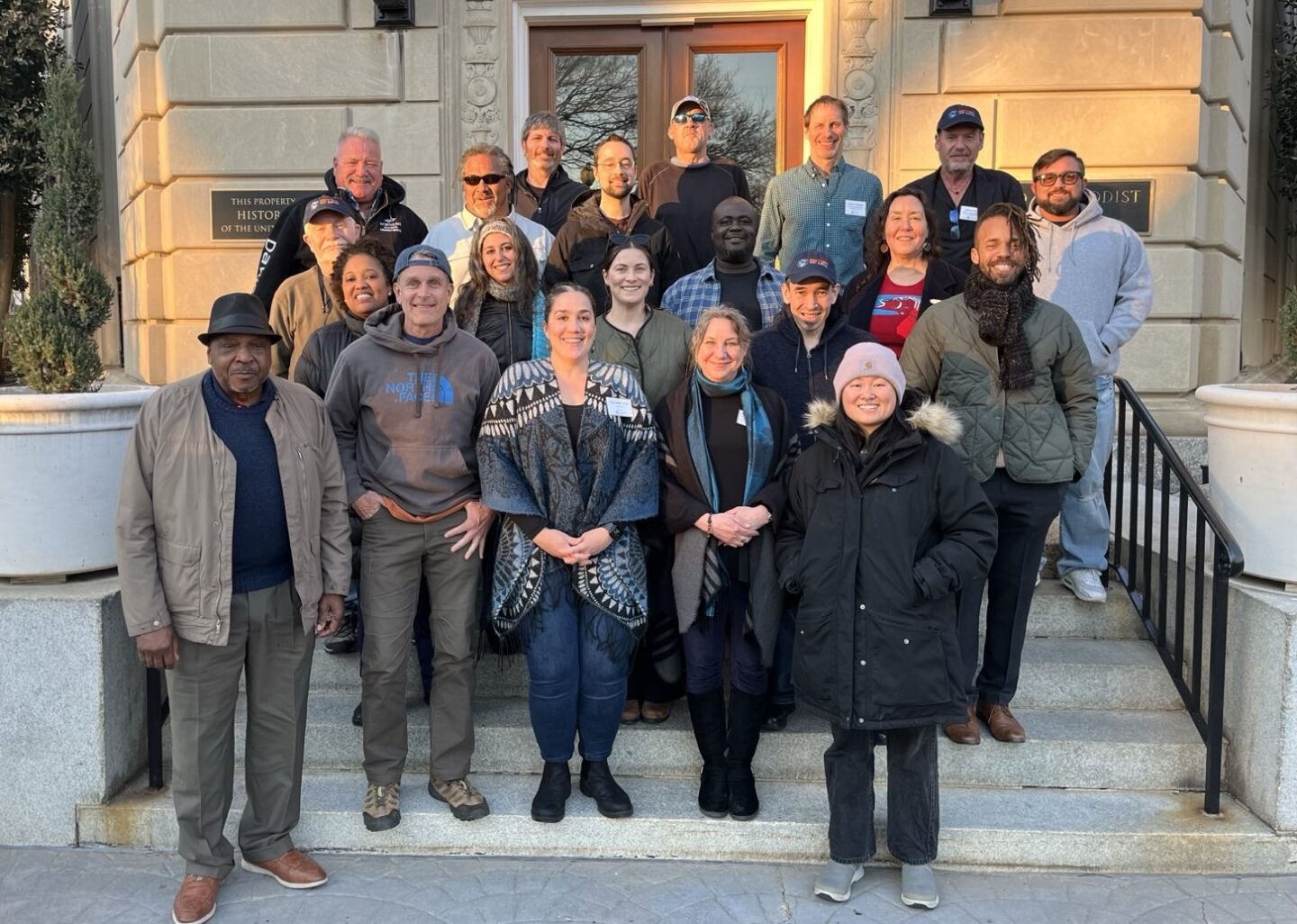by Haley Stein
Communications and Fundraising Coordinator, Inland Ocean Coalition
Before diving into the whirlwind of strategy sessions, conversations, shared meals, and Hill visits that I took part in at the Don’t Cage Our Oceans (DCO2) fly-in in Washington, D.C., I want to share a bit about who brought us together. DCO2 is a growing coalition of organizations working to stop the spread of industrial-scale offshore fish farming. Just as importantly, the coalition is committed to uplifting values-based aquaculture: practices which are community-led, appropriately scaled, grounded in place-based knowledge, and designed to protect marine ecosystems.
This year’s fly-in brought together DCO2’s member organizations — including the Inland Ocean Coalition, where I work — along with allies from across North America to connect with lawmakers and build momentum toward a more just seafood system.
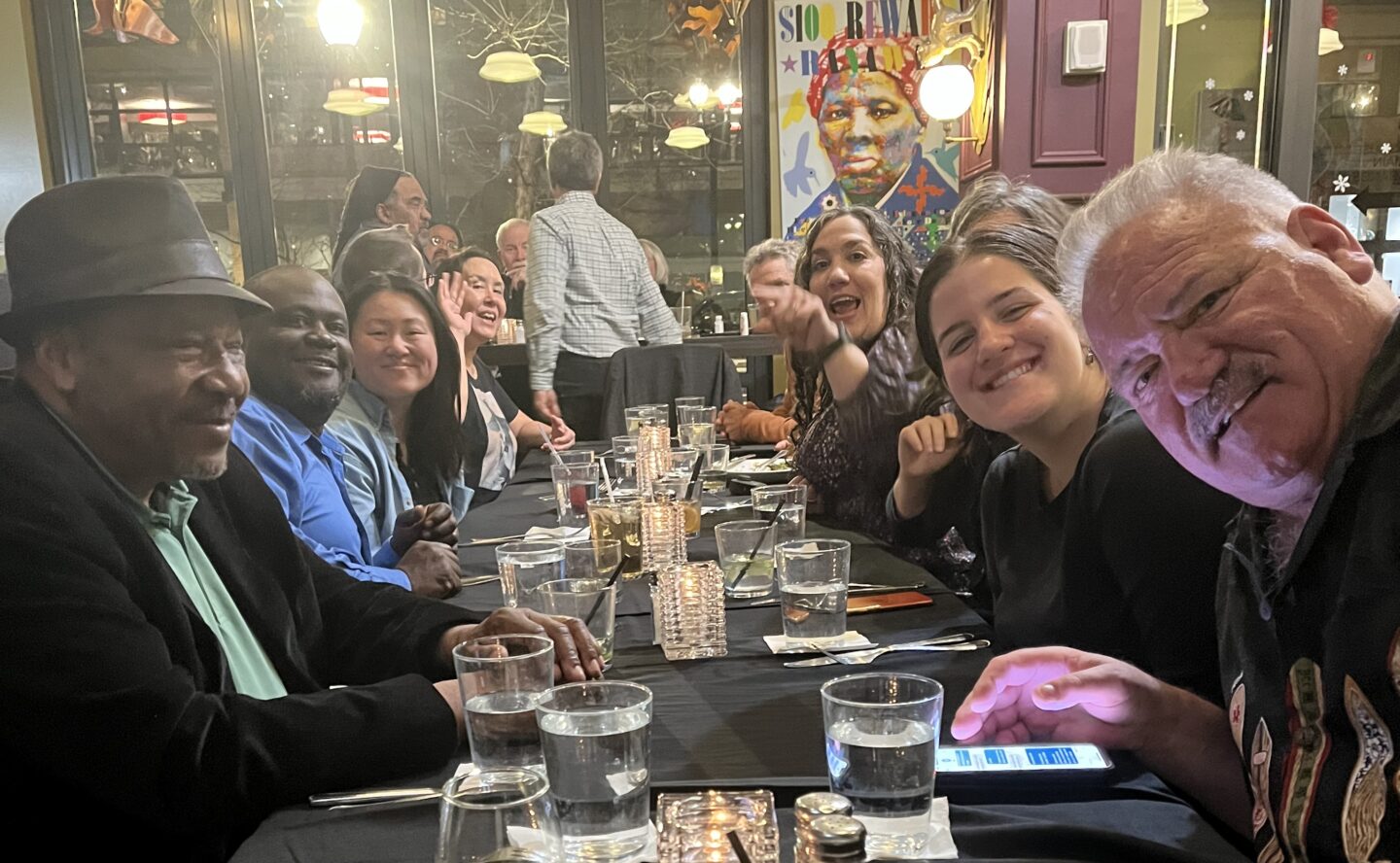
community gathering space in Washington, D.C. Photo courtesy of Andrianna Natsoulas.
Day 1: Arrival and talking strategy
Full transparency: I didn’t actually “fly in” to the Don’t Cage Our Oceans (DCO2) fly-in! I caught an Amtrak instead from New York City. The train ride was easy, and I made it to the United Methodist Building, our home base for the gathering, right in time to meet with all the other fisherfolks, advocates, chefs, and ocean lovers. It was great to see some familiar faces: fellow Mainer and NAMA program director Pedro Altagracia, Captain Charlie Abner from the Southern Atlantic coast, and salmon fisherwoman Melanie Brown, who traveled all the way from Alaska. I’d met them and a few others the year before at Slow Fish Charleston.
I was also happy to get to know new friends of DCO2 on that first day, like Colles Stowell from One Fish Foundation, also a Mainer, and Jim Goodman of Wisconsin, an advocate for family farmers with the National Family Farm Coalition (NFFC). Jim joined us to make that connection between small scale food production on land and at sea.
We organized into regional groups for our Hill visits, with teams representing the Pacific Northwest and Alaska, New England, the South Atlantic, the Gulf, and inland communities. All of us came together with the same goal: to speak with our members of Congress about why domestic values-based seafood systems are important to families and economies in the U.S., and how Congress can support them through enacting policy that pushes back against the interests of large-scale industrial aquaculture projects.
As the communications and fundraising coordinator for Colorado-based Inland Ocean Coalition (IOC), I joined Jim Goodman, Antonio Tovar (senior policy associate for NFFC), Chelsea Lees (co-founder of WAVES Research), and Andrianna Natsoulas (campaign director for Don’t Cage Our Oceans) in a series of meetings with representatives from non-coastal states. Together, we spoke about why communities across the U.S. should care about the quality and ethical production of seafood, even if we don’t live by a working waterfront.
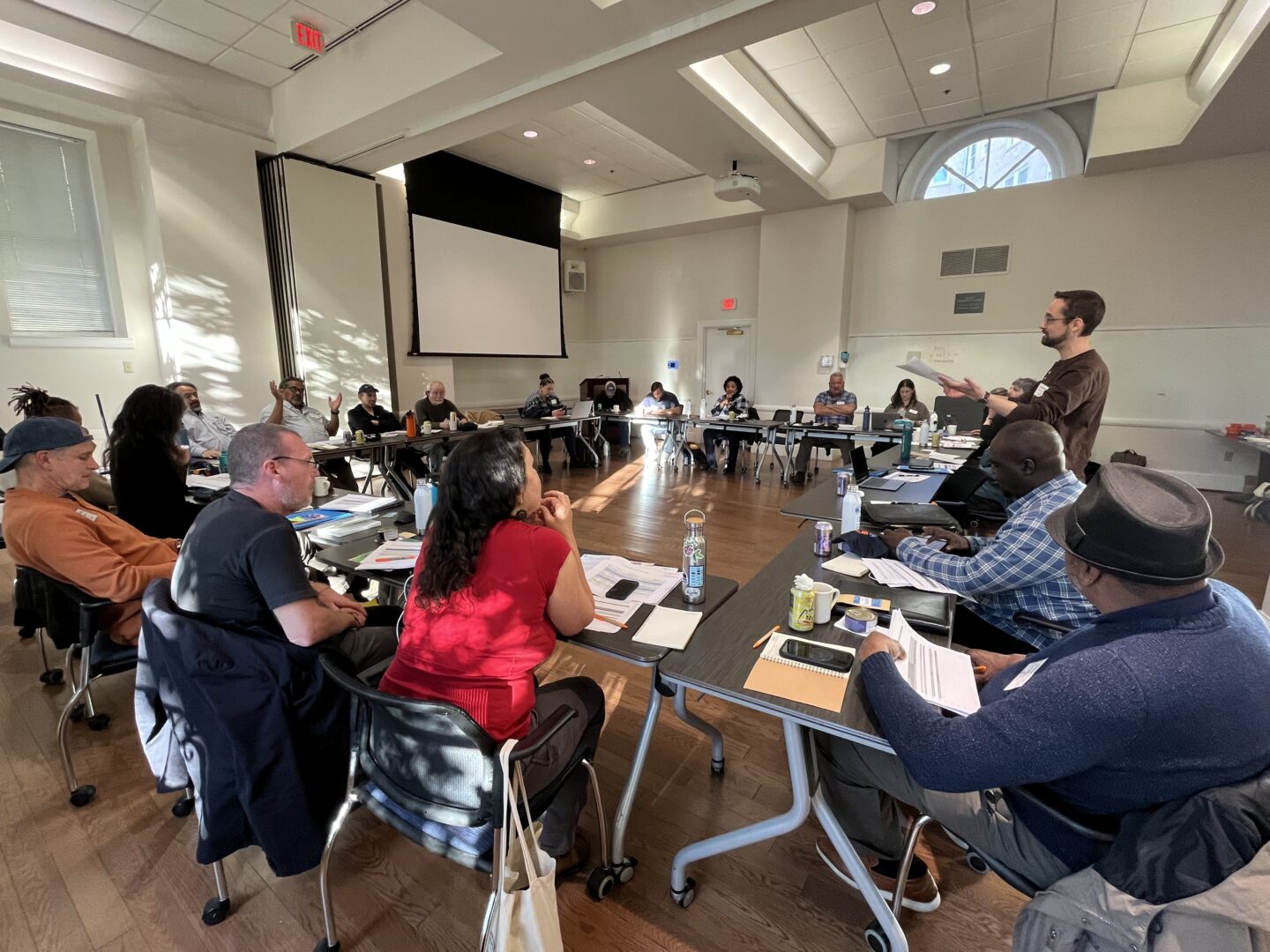
which took place in Washington, D.C. in March. Photo courtesy of Feini Yin.
At the Methodist Building, we introduced ourselves and shared a scrumptious meal of shrimp gumbo and cornbread prepared and served up by Bubba Green of Gullah Grub, a DCO2 coalition member. During the DCO2 Members meeting, I learned so much just from conversation with this diverse group of passionate fish folks, who were all in good spirits and energized to defend their livelihoods and communities. Discussing priorities for DCO2 in the upcoming year, I was so impressed how the list of opportunities we generated stretched so much longer than our identified (well-thought out and very real!) challenges. One thing was clear: the folks gathered for this fly-in were full of hope and creativity, and ready to launch into action.
We did even more learning, breaking into small groups to discuss the Aquaculture Atlas project, communications, and policy. I was in the Atlas discussion group, as I have recently taken on assisting with communications strategy for that project alongside my IOC colleague Mia Glover. In only its early stages now, the Atlas project will be an important tool for supporting values-based aquaculture projects across the U.S. Digging into the details with others in D.C. made me even more excited to be on the team building this resource, and cultivating its potential to get better quality data (and shellfish!) to people who need it most.
We worked until it was time for dinner, which was a delicious, comforting meal provided by Ryan at Green Plate Catering that really hit the spot after a long day. Then, we went off to the hotel to rest up before a big next day.
Day 2: Hitting the Hill
The next day, I got an early start, first meeting with Colorado’s representative for the 2nd congressional district, Joe Neguse. Representative Neguse has been a long-time friend and supporter of the IOC, having attended our Masquerade Mermaid Ball in previous years. After our conversation, we even nabbed a handshake and photo with Rep. Neguse himself!
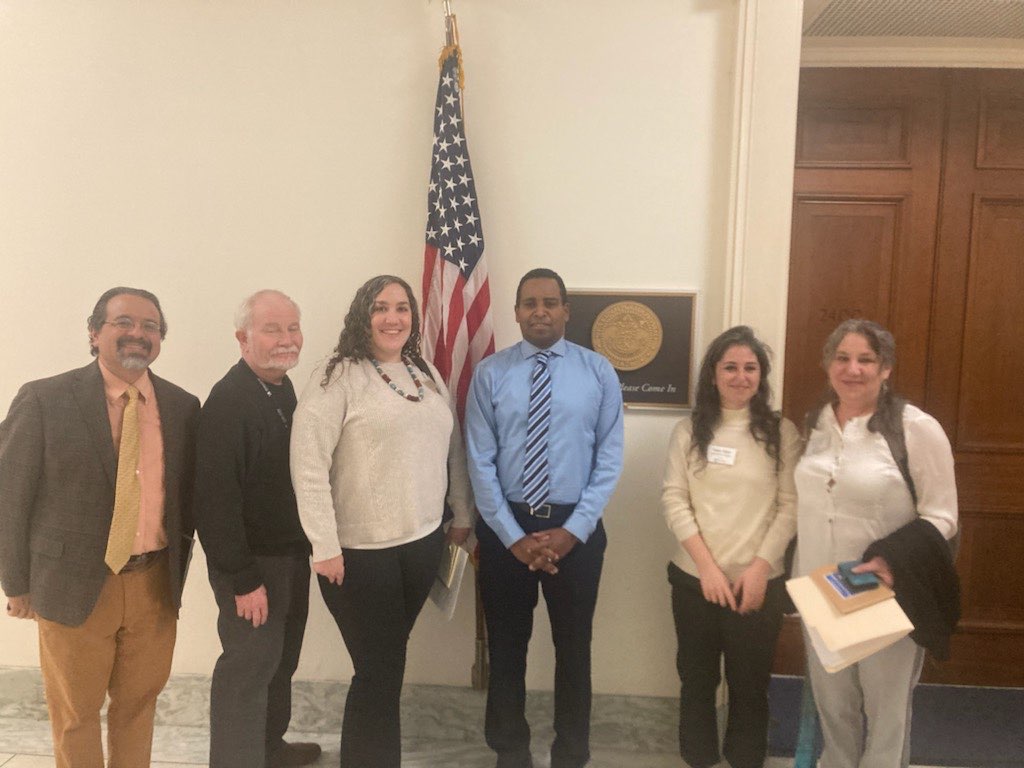
For my second meeting, I joined New Englanders Jason Jarvis, a Rhode Island fishermen, board president of NAMA, and co-founder of the Quonnie Fish Cooperative; Doug Feeney, a Massachusetts fisherman and president of the Chatham Harvesters Cooperative; and Mainers Colles (One Fish Foundation) and Pedro (NAMA). I was representing IOC’s interests, of course, but also my personal investment in locally-owned New England seafood production as a resident of Downeast Washington County, Maine. We stressed the importance of making seafood processing available in the U.S., so that small-scale fishers wouldn’t have to ship their catch all the way to Asia and back before putting it in front of consumers. The Domestic Seafood Production Act (DSPA) would give working waterfront communities the support and resources they need to make processing possible on American soil. (A related bill, the newly introduced, bipartisan Keep Finfish Free Act of 2025, focuses on one piece of DSPA: preventing industrial finfish farming in U.S. federal waters.)
I talked about the town of Lubec, Maine, and how it was once a thriving, bustling sardine-canning town, with over 20 canneries and nearly 30 herring smokehouses, per the McCurdy Smokehouse website. McCurdy Smokehouse, shuttering operations in 1991, was the last operating commercial herring smokehouse in the country. The revitalization of this industry could have a monumental impact on the local economy of small towns like Lubec across the New England seaboard. DSPA could make it possible to restore capacity for fish processing on American terrain, breathing life into our working waterfronts and allowing for greater connection between our nation’s harvesters and seafood lovers. In that meeting, the most impactful statements came from Doug, who has an intimate understanding of the waters of Massachusetts, and spoke eloquently about what it would take to allow his local fishery to thrive.
All in all, the day of meetings felt like a huge success. The energy of my friends and colleagues was palpable, and it really felt meaningful to make that person-to-person connection on the Hill, championing more sustainable shores. At a beautiful dinner at Busboys and Poets that night, we caught up with coalition members who spoke on behalf of other regions. Together, we celebrated our efforts to make change for American seafood communities, who contribute to our country’s cultural fabric, steward our oceans, and work tirelessly to feed us.
At Inland Ocean Coalition, we operate from the assertion that what happens in the ocean impacts watersheds and communities inland, and vice versa. We are all downstream of each other, and I was so impressed to find the representatives I spoke with engaged and onboard with this principle. James Mitchell, DCO2’s legislative director who regularly speaks with the hardworking people on Capitol Hill, made it clear to us that when we all showed up as fisherfolk, food advocates, and passionate ocean conservationists from our diverse corners of the country, from Alaska to Maine to the Gulf Coast, it made a powerful difference in getting our message across.
I hope we can build on that momentum, applying more pressure to make industrial fish farms a thing of the past, focusing instead on protecting and investing in the health of the ocean and in a local values-based fishing economy. May the conversations we had this spring fuel real change for American fisherfolk and seafood consumers alike.
Header photo: DCO2 fly-in participants on the steps of the United Methodist Building in Washington, D.C. Photo courtesy of Feini Yin.
